Reports of Past Events
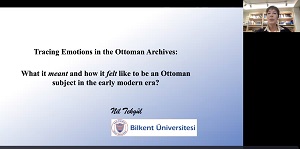
The Tobunken Seminar “Workshop Series on Ottoman History I: New Readings of Ottoman Sources”
The Tobunken Seminar "Workshop Series on Ottoman History I: New Readings of Ottoman Sources" was held online on October 22, 2022, attended by 27 participants from Japan, Turkey, and Germany. Doctor Nil Tekgül from Bilkent University gave a presentation entitled "Tracing Emotions in the Ottoman Archives: What it meant and how it felt like to be an Ottoman subject in the early modern era?" She first demonstrated the methodology of the history of emotions and then discussed the issues such as emotion codes and emotional communities in early modern Ottoman society based on archival documents. This workshop was supported by JSPS KAKENHI Grant Number 20H01322. Date and time: October 22,
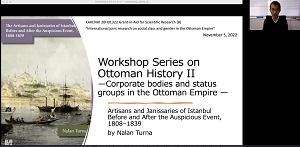
The Tobunken Seminar “Workshop Series on Ottoman History 2: Corporate bodies and status groups in the Ottoman Empire”
The Tobunken Seminar "Workshop Series on Ottoman History 2: Corporate bodies and status groups in the Ottoman Empire" was held online on November 5, 2022, attended by 26 participants from Japan and Turkey. Professor Nalan Turna (Yıldız Technical University, Turkey) gave a presentation entitled "Artisans and Janissaries of Istanbul Before and After the Auspicious Event, 1808–1839" and discussed the transformation of the artisans after the abolition of the Janissaries in 1826. Professor Eunjeong Yi (Seoul National University) gave comments and questions on the presentation, followed by a lively discussion over the issues such as the relationship between artisans and Janissaries and the concept of "economic Tanzimat." This workshop was supported
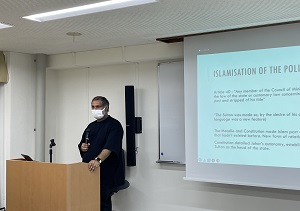
Tobunken Seminar: “Asiatic Imperial Constitutional Making – Legal Borrowings from the Ottomans by the Asiatic World”
The Tobunken Seminar "Asiatic Imperial Constitutional Making – Legal Borrowings from the Ottomans by the Asiatic World" was held both in person and online on August 4, 2022, attended by 6 in-person participants and about 20 online participants. Doctor Yakoob Ahmed, visiting fellow at the Institute for Advanced Studies on Asia, the University of Tokyo, gave a lecture on the interconnectedness between the constitutional making in the Ottoman Empire, Japan, China, and Johor and discussed how the latter three saw the Ottoman experience and whether there were "Asian" features in the constitutional process in these states. Date and time: August 4, 2022 (Thu) 15:30~17:00 Venue: Large meeting room (3rd floor),
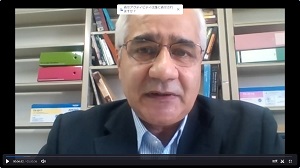
1st Tobunken Staff Seminar (Academic Year 2022) “Connecting East Asia to Europe via the Caspian Sea, Caucasus and Russia: Iran`s plan to open a new Silk Road during the Safavid era (17th century)”
1st Tobunken Staff Seminar in AY 2022 "Connecting East Asia to Europe via the Caspian Sea, Caucasus and Russia: Iran's plan to open a new Silk Road during the Safavid era (17th century)" (Lecturer: Prof. Mansur Sefatgol) was held online on June 16, 2022, attended by 45 people. The establishment of the Safavid Empire (1501-1736) was the beginning of a relatively new structure in Iran. At the same time there were dramatic changes in West Asia and global conditions. The rise of the Ottomans, Mughal India, Uzbek Khanate, Russian Tsardom, and the presence of the Portuguese in the Persian Gulf led to the decline of traditional trade network and route
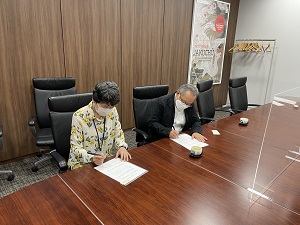
Signed MoU with Japan Foundation
At 3:00 pm, on 13th of May, 2022, Director Takahashi of our institute signed MoU (Memorandum of Understanding) with Japan Foundation at their headquarter in Yotsuya, Tokyo. Under the banner of “JF-GJS Initiatives,” we decided to jointly organize (1) meetings for Japanese Studies Fellows invited by the Japan Foundation, (2) seminars and workshops which will contribute to the fruitful dialogue between Japanese studies in Asia and Asian studies in Japan, (3) educational programs for next generations of Japanese studies in Asia as well as Asian study experts in Japan, and so on from 2022 to 2025 (possibly to 2027).“JF-GJS Initiatives” will start under the supervision by GAS (Global Asian Studies)
The latest issue of the International Journal of Asian Studies (Vol.17-1) is now available online.
The latest issue of the International Journal of Asian Studies (Vol.17-1) is now available online. COVER & TABLE OF CONTENTS:https://www.cambridge.org/core/services/aop-cambridge-core/content/view/57F52FB559AA5F4ECA4CC83591EA1EAC/S1479591420000182a.pdf/asi_volume_17_issue_1_cover_and_front_matter.pdf ARTICLES Genealogies of the “Paika Rebellion”: Heterogeneities and Linkages AKIO TANABE Jürgen Hinzpeter and Foreign Correspondents in the 1980 Kwangju Uprising ANDREW DAVID JACKSON From Chimera’s Womb: The Manchukuo Bureaucracy and Its Legacy in East Asia ROLF I. SIVERSON The Philosophy of the Myōken: The Ethics of the Dead and Bodhisattvas FUMIHIKO SUEKI (Translated by Anton Luis Sevilla) ARTICLES IN THE LATEST ISSUE: https://www.cambridge.org/core/journals/international-journal-of-asian-studies/latest-issue *We celebrate the life of Aileen S. P. Baviera, who lost her life to COVID-19 after attending an international conference to fulfill her mission as an expert in security
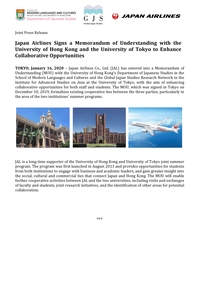
GJS Research Network has entered into a MoU with HKU and JAL
The Global Japan Studies (GJS) Research Networkin the Institute for Advanced Studies in Asia at the Universityof Tokyo has entered into a Memorandum of Understanding (MoU) with the University of Hong Kong’s Department of Japanese Studiesin the School of Modern Languages and Cultures and Japan AirlinesCo.,Ltd.(JAL), with the aim of enhancing collaborative opportunitiesfor both staff and students. For details, check the following URL. https://press.jal.co.jp/en/release/202001/005448.html
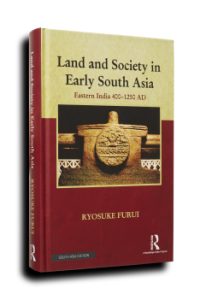
A Publication from a Faculty Member Ryosuke Furui “Land and Society in Early South Asia : Easter India 400-1250 AD” (Routledge).
This volume explores the process of social changes which unfolded in rural society of early medieval Bengal, especially the formation of stratified land relations and occupational groups which later got systematised as jātis. One of the first books to systematically reconstruct the early history of the region, this book presents a history of the economy, polity, law, and social order of early medieval Bengal through a comprehensive study of land and society. It traces the changing power relations among constituents of rural society and political institutions, and unravels the contradictions growing among them. The author describes the changing forms of agrarian development which were deeply associated with these overarching structures
A new issue of the International Journal of Asian Studies vol.16-2 was released.
A new issue of the International Journal of Asian Studies vol.16-2 was released. Direct Link:https://www.cambridge.org/core/journals/international-journal-of-asian-studies/issue/9CB7D406F791E29C81A76B0944B3436A ref." International Journal of Asian Studies" in Cambridge Core
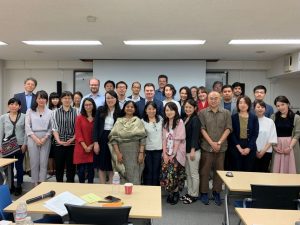
Tobunken-ASNET Symposium”Ito International Research Centre Symposium『Crossing Boundaries: Migration, Mediation, Morality』”
Report Ito International Research Center Symposium “Crossing Boundaries: Migration, Mediation, Morality” was held from 8th to 10th of June, 2019. Pictures of the Symposium The symposium was attended by over 100 researchers, students, and interested citizens. Below are the reports of the symposium written by the participants. 【Report 1】This symposium provided a truly interdisciplinary perspective on the now highly pertinent topic of international migration. By bringing together leading scholars from fields of anthropology, sociology and the physical sciences, the three-day event allowed participants to cross not only the boundaries of nations and ethnicities, but also disciplines and different angles of looking at the same phenomenon.Despite the disparate disciplines of its
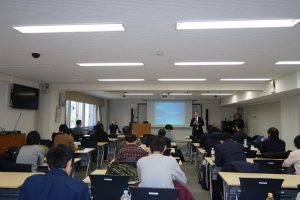
Tobunken-GJS Workshop “Japanese Philosophy and the Philosophy at the University of Tokyo (The 3rd “Tokyo School” Workshop )”
GJS Workshop Report 科研費基盤研究(B)「東京学派の研究」(研究代表:中島隆博)の活動の一環として、2019年1月22日(火)に、東京大学東洋文化研究所第一会議室において、 「日本哲学と東京大学の哲学」と題してワークショップを行いました。今回は、科研費基盤研究(B)「『哲学雑誌』のアーカイヴ化を基礎とした近代日本哲学の成立と展 開に関する分析的研究」(研究代表:鈴木泉)との共催です。 お招きしたのは、トマス・カスリス先生(オハイオ州立大学特別名誉教授)小林康夫先生(青 山学院大学、東京大学名誉教授)でした。カスリス先生は、“The Tokyo School of Philosophy? A Prolegomenon”と題して講演をいただきました。前半では、「東京学 派」という名前に変えて、「東京流」もしくは「東京スタイル」とすべきだとのご提案があり、後半では、京都と東京の「風土」論的な「二都物語」を展開していただき ました。無論、「東京学派」は、中心のある、特定の方法論とテーマを共有する「学派」ではありませんので、「流」や「スタイル」の方がより適切であるとは思います 。ただ、「東京学派」という、すぐに批判を生みそうな概念には、何か発見的な骨太さがあるようにも思います。 小林先生は、駒場の哲学を代表してきた4 名の哲学者(廣松渉、坂部恵、大森荘蔵、井上忠)についてお書きになった“The Komaba Quartet: A Landscape of Japanese Philosophy in the 1970s”(The Oxford Handbook of Japanese Philosophy)の元になった日本語原稿を朗読してくださいました。わたしたちの世代にとっては、まだ昨日のような出来事であったものが、若い学 生にとってはすでに歴史であり、距離を取って理解すべき対象になっていたことを思い知らされました。それでも、この4名の哲学者が建てた中心課題である「こと」も しくは「哲学すること」をどう継承するかは、今でも喫緊の課題だと思います。 鈴木泉先生と納富信留先生には議論に深く入っていただき、「東京学派」の 定義や、坂部恵先生と井上忠先生の可能性と限界についてご議論いただきました。(中島 隆博) Pictures of the Workshop Organizer: The Global Japan Studies Network (GJS) Co-organizer: Institute for Advanced Studeis on Asia (IASA) Contact: gjs[at]ioc.u-tokyo.ac.jp
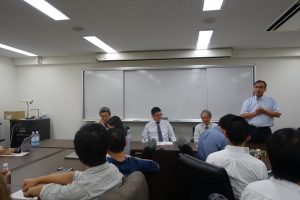
Tobunken-GJS Workshop “Regarding Chinesee Philosophy” (The ‘Tokyo School’ project 2nd workshop)
GJS Workshop Report 科研基盤B「東京学派の研究」の第二回ワークショップ「中国哲学をめぐって」を、2018年10月4日に東洋文化研究所第一会議室で開催いたしました。多くの参加者に来ていただくことができ、大変充実した会となりました。佐藤将之先生(台湾大学)からは、井上哲次郎と井上円了に焦点を当てて、東京大学草創期の中国哲学の状況についてお話をいただきました。井上円了の『星界想遊記』が康有為の『大同書』に影響を与えたという新しい論点も出していただきました。小島毅先生(東京大学)からは、中国哲学史における時代区分論についてのお話をいただきました。それが中国歴史学における時代区分論、そして中国文学史における時代区分論とどう重なるかを論じていただきました。石井剛先生(東京大学)からは、東京学派と中国「近代」哲学の関係についてお話をいただきました。われわれが思っている以上に、当時の日本と中国の哲学的影響関係が大きいことをお示しいただきました。 Pictures of the Workshop Organizer: The Global Japan Studies Network (GJS) Co-organizer: Institute for Advanced Studies on Asia, the University of Tokyo
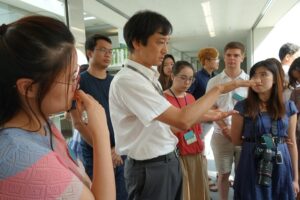
The Global Japan Studies Summer Program 2018: AN INQUIRY INTO JAPAN’S POSTWAR
Report The 3rd annual Global Japan Studies summer program "AN INQUIRY INTO JAPAN’S POSTWAR was successfully held from July 30 – August 10. Participants include 19 undergraduate and graduate students from overseas universities and one student from the University of Tokyo. Overseas universities are Chinese University of Hong Kong at Shenzhen, Vassar College, Gengdan Institute of Beijing University of Technology, University of Amsterdam, New York University Shanghai, University of Saint Andrews, Sciences Po Paris, University of Nottingham, University of Arizona, University of Cambridge, University of Alberta, University of Hong Kong, National Tsinghua University, Taiyuan Normal University, University of Toronto, Shanghai International Studies University, as well as Tsukuba University. Participants come
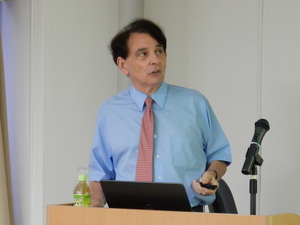
Tobunken-JATS Seminar (Lecture on the US-Taiwan-China Relations ): “The Big Picture: China Under Xi and What It Means for the U.S.-Taiwan-China Relations” is held
Report How does the United States handle an increasingly confident China under the leadership of Xi Jinping? Does the Trump administration’s first National Security Strategy that labels China as a “strategic competitor” set the tone for the U.S.-China relations in the near future? Is Taiwan a bargaining chip for the United States to gain leverage with China? On July 4, the Institute for Advanced Studies on Asia and the Japan Association for Taiwan Studies co-hosted a discussion on the prospects for U.S.-Taiwan-China relations. The event featured a talk by Dr. William A. Stanton, Professor at the National Taiwan University and former Director of the American Institute in Taiwan (AIT), and
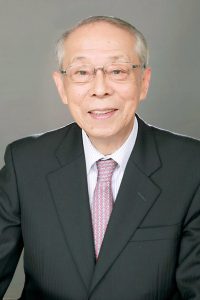
Dr. Yoshinobu Shiba, Professor Emeritus of The University of Tokyo and former director of the Institute for Advanced Studies on Asia, is going to be awarded the 2018 Tang Prize in Sinology
Dr. Yoshinobu Shiba, Professor Emeritus of The University of Tokyo and former director of the Institute for Advanced Studies on Asia, is going to be awarded the 2018 Tang Prize in Sinology for his outstanding achievements in China studies through his mastery and depth of insight into Chinese socio-economic history. The Tang Prize, established in 2012, in Taiwan, is bestowed internationally to laureates in four prize categories: Sustainable Development, Biopharmaceutical Science, Sinology, and Rule of Law. Dr. Shiba is the first Japanese winner in Sinology. We wish to extend our congratulations to Dr. Shiba for the high recognition placed on his scholarship within the long tradition of China studies.
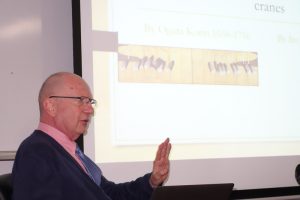
The 26th GJS Lecture “Individuality in Early Modern Japan”
Report On May 15, 2018, Professor Peter Nosco from the University of British Columbia gave a talk entitled ‘Individuality in Early Modern Japan: Thinking for Oneself', which is based on his recently published monograph of the same title both in Japanese and in English. His talk revolved around a provocative question: whether individuality in Japan was prominent two centuries ago than today. Beginning from the explanation of how he found his way to this inquiry, Professor Nosco, by drawing on some examples, effectively demonstrated how individuality is considered to have been more prevailing in Edo Japan than in the Meiji period and possibly in this Heisei period. The lively discussion
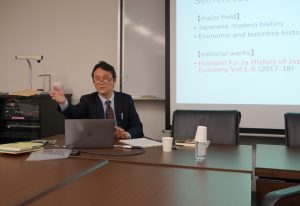
The 25th Tobunken-GJS Lecture “Diversification and Convergence: The Development of locomotive technology in Meiji Japan” was held
Report On January 19, 2018, Professor Naofumi Nakamura, Senior Associate Director of the Institute of Social Science at the University of Tokyo, gave a talk entitled "Diversification and Convergence: The Development of locomotive Technology in Meiji Japan" at the Global Japan Studies Lecture Series. The talk was chaired by Professor Shigeto Sonoda of the Institute for Advanced Studies on Asia. In his talk, Professor Nakamura traced the process of Japan's railway technology development which he divided into four stages and analyzed the characteristics of each stage. With various figures and graphs, his talk provided a clear picture of how Japanese locomotive and railway technology has evolved during the Meiji period
Global Japan Studies Special Event “The University of Chicago & The University of Tokyo Joint Graduate Workshop and Faculty Roundtable” was held
Report The University of Chicago and The University of Tokyo Joint Graduate Workshop and Faculty Roundtable were held on December 13 at Institute for Advanced Studies on Asia, the University of Tokyo. Gukchin SONG, Felix BORTHWICK, and KIZUKI Nagisa, all from the University of Tokyo, and FENG Naixi, KANAHARA Noriko, and Erin NEWTON, all from the University of Tokyo, gave presentations on their recent research projects. In the afternoon session entitled “Round Table: Three Perspectives on Japanese Studies,” Professor James KETELAAR from the University of Chicago, Professor SONODA Shigeto and Professor NAKAJIMA Takahiro from the University of Tokyo exchanged their views and expectations of Japanese studies in the future. Including
